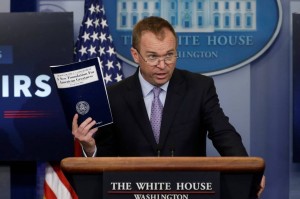Bipartisan Pushback Greets Trump’s Proposed Budget
< < Go Back
Trump budget gets self-serving reactions from both sides of the aisle based on impact to state projects.
White House’s $4.1 trillion spending blueprint relies on economic growth of 3% by 2021.
President Donald Trump faced swift resistance from Democrats and a range of Republicans on Capitol Hill on Tuesday after offering a 10-year plan to balance the federal budget that depends heavily on cuts to government safety-net programs and expectations of a big gain in economic growth.
The White House budget proposal for the 2018 fiscal year that begins Oct. 1 would cut federal spending by $4.5 trillion over 10 years. But it leaves mostly untouched the big entitlement programs—Social Security and Medicare for retirees—and proposes increases to infrastructure spending, a new parental leave program and a short-term boost to military spending.
With those priorities set—in addition to the shared Republican goal of cutting taxes—the White House offered up significant reductions in other spending programs to further the aim of reducing budget deficits. But the call for rolling back programs that touched their constituents made lawmakers bristle.
The proposal, which serves as a recommendation to Congress, is likely to be largely rewritten when lawmakers craft their own budget resolutions in the coming months.
“I hate to say it, but I would say the budget was dead before the ink was dry,” Rep. Don Young (R., Alaska), who opposes the budget’s elimination of two programs in his state.
Payments to Medicaid, the federal-state health program for the poor, would be cut by more than $600 billion over a decade from levels projected under current law in addition to proposed Medicaid cuts under the House bill repealing and replacing much of the Affordable Care Act.
The food-stamp program would be cut over 10 years by $193 billion, the student-loan program by $143 billion, disability payments by $72 billion and farm subsidies by $38 billion.
“The proposed cuts to some federal programs are not mere shavings; they are rather deep and harmful to my district spanning Kentucky’s Appalachian region and other rural, impoverished parts of the country,” Rep. Hal Rogers (R., Ky.), a former chairman of the House Appropriations Committee, said of the proposal.
Democrats blasted the overall budget proposal.
“This is the budget you write if you think working families have it too easy,” Sen. Ron Wyden (D., Ore.) said.
Mr. Trump’s budget risks alienating at least some of his core voters who rely on programs that he is proposing to cut. Rural white voters are among his staunchest supporters, the latest Wall Street Journal/NBC News poll shows. While the president’s overall approval rating was 39%, 52% of rural voters said they approved of his performance.
More From The Wall Street Journal (subscription required):




